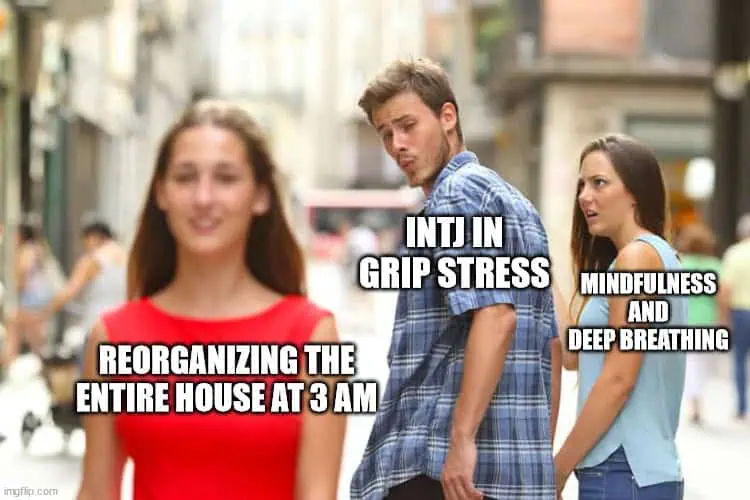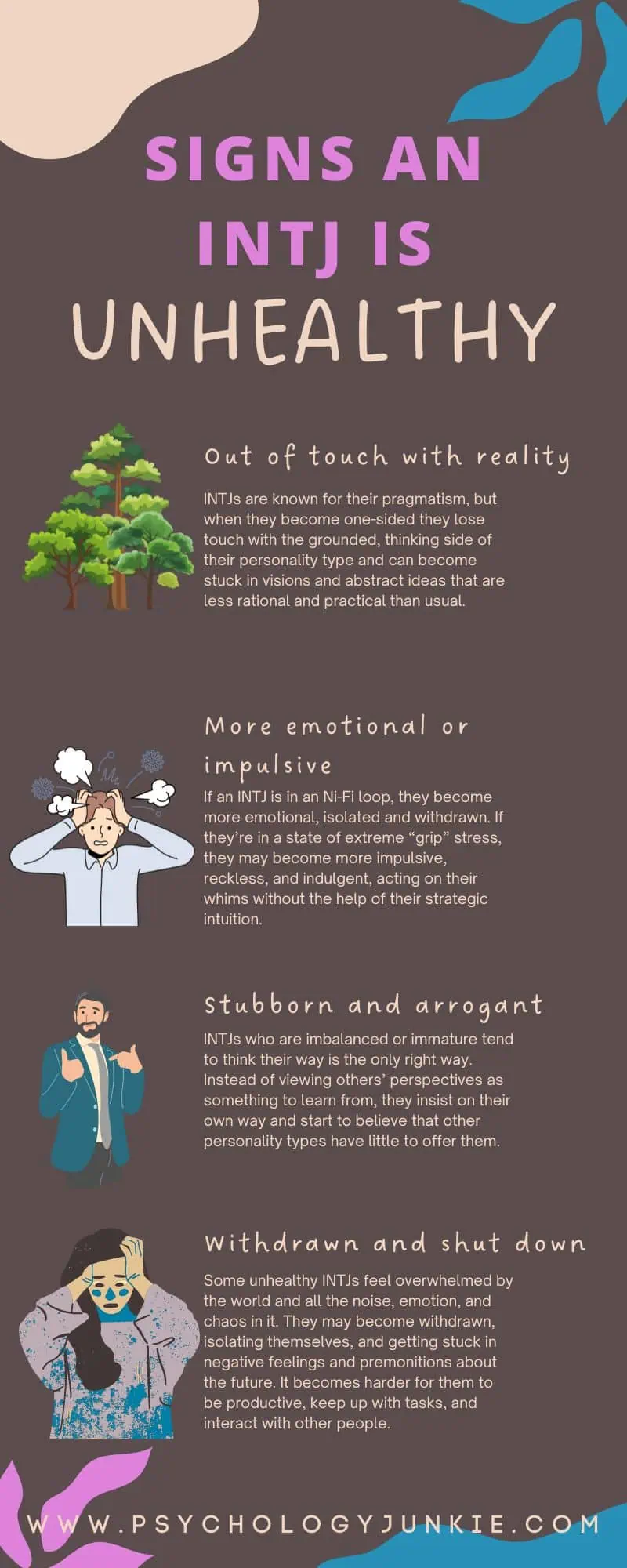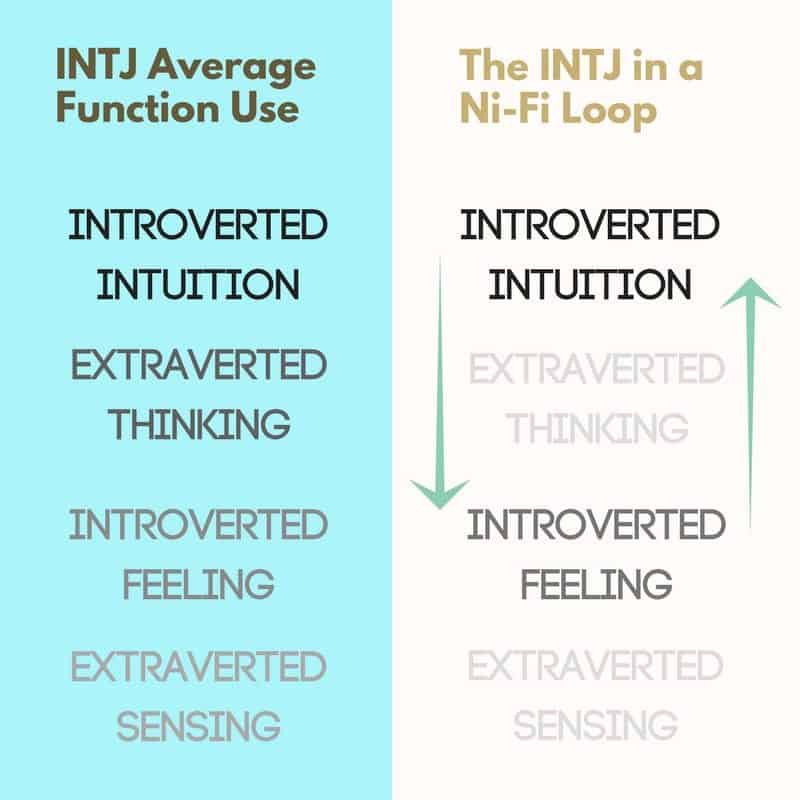The Dark Side of the INTJ Personality Type
Ever wondered what an INTJ in their dark side is like? Or maybe you are an INTJ and you’re noticing some… let’s call them “intense” behaviors creeping in. Maybe you’ve found yourself feeling like the only person with a brain in a world of chaos, or perhaps you’ve been convinced that if only everyone would just listen to you, things would actually make sense. Relax—you’re not alone, and you’re not turning into a supervillain. (Though maybe you’d be a very efficient one.)
INTJs are usually the cool, collected thinkers, able to see patterns and possibilities others miss. But when pushed to their limits, even the calmest Strategist can find themselves on the edge of an intense spiral. Today, we’re diving into the INTJ dark side. What happens when an INTJ’s strengths get pushed to the extreme? What triggers these shifts, and how can they come back to center?

Table of contents
- But first, what exactly is an INTJ?
- The INTJ Stress Reaction: When the World Starts Closing In
- The INTJ Under Stress: Isolation, Obsessive Analysis, and Irritability
- The Grip of Chronic Stress: When Se Takes Over
- The Unbalanced INTJ: When You’re All Vision, No Grounding
- The INTJ Ni-Fi Loop
- Breaking Free: Reconnecting with Te
- Getting Out of the Dark Side: Tips for INTJs to Rebalance and Reconnect
- What Do You Think?
- Other Articles You Might Enjoy:
- References:
Estimated reading time: 1 minute
But first, what exactly is an INTJ?
INTJs are known for their independence, vision, and strategic minds. They’re life’s game-changers, always hunting for ways to improve and optimize. If they seem to be staring off into the distance, it’s not because they’re spacing out—it’s because they’re planning twenty years in advance.
For those new to the type, INTJ stands for Introvert, Intuitive, Thinking, and Judging:
- Introverted: They need plenty of time alone to recharge and reflect. People can be great… just not all the time.
- Intuitive: They’re big-picture thinkers, constantly analyzing and forecasting rather than fixating on the here and now.
- Thinking: Logic and objectivity are their main navigational tools. Emotions have a place, but typically, it’s in the back seat.
- Judging: Planning and structure are their best friends. INTJs like things organized, and they love knowing they’re moving toward a goal.
But when stress hits, these natural traits can take a darker turn. Let’s look at what really stresses INTJs out and what happens when they’re pushed to their breaking point.
The INTJ Stress Reaction: When the World Starts Closing In
INTJs are usually cool under pressure. They can handle complex problems, big challenges, and plenty of alone time to focus. But when stress hits—especially when their environment feels chaotic or disorganized —INTJs start to feel like their whole world is tilting off-balance. They’re used to being efficient and in control, but when that control slips, it’s like everything is on the line.
What Triggers INTJ Stress?
Here are a few classic INTJ stressors:
- Being in environments that undervalue their ideas or skills
- Lacking enough time alone to think and recharge
- Too much sensory chaos—think loud noises, constant interruptions, or bright lights
- Working with people they see as incompetent or (worse) lazy
- Being forced to juggle tons of small details instead of focusing on the big picture
- Having their well-laid plans disrupted
- Getting stuck in unfamiliar situations without a plan
- Feeling unable to envision or work toward a future goal
When these stressors start piling up, INTJs tend to do what they do best: pull back from the world to focus. It’s like they’re saying, Alright, everyone, I’ll be in my bunker—don’t call me, I’ll call you. But when they stay in that bunker too long, things can take a turn.
The INTJ Under Stress: Isolation, Obsessive Analysis, and Irritability

When INTJs start feeling that the world isn’t cooperating with their plans, their first move is usually isolation. They shut out distractions and dive into problem-solving mode, trying to think their way to a solution. This works sometimes, but if the problem keeps mounting, their stress only deepens. The quiet INTJ solitude that once helped them think starts turning into a fortress—built to keep the “inefficient” world out.
Under prolonged stress, INTJs may become hypercritical, obsessive, or stuck in a rut. One INTJ I worked with described how, under stress, he would “look around at people and wonder why they couldn’t just get things done.” He found himself frustrated, and his patience for small talk (which was already low) hit rock bottom.
When they get to this stage, INTJs can become so absorbed in their thoughts that they start ruminating—obsessing over every tiny detail, every possible flaw in their own logic, and every potential risk. They may even feel like nothing they do is enough, or that they’re somehow losing their edge.
INTJs at this level of stress can struggle with self-doubt, questioning their ability to handle problems they would normally tackle with ease. I once had an INTJ client who confessed that, when he got stressed, he’d sit in his closet with the lights off, looking for the one solution that would fix everything, waiting for it to appear to him… only to realize he’d spent hours in his head with zero solutions to show for it. “It’s like my brain’s trying to compute but all the circuits are just…fried.”
In his case, he was probably over-relying on his Introverted Intuition, and in the process it was getting worn down and exhausted.
The Grip of Chronic Stress: When Se Takes Over

In cases of chronic stress, INTJs may find themselves “in the grip” of their inferior function: Extraverted Sensing (Se). This is where things can get really uncharacteristic. Normally focused on the big picture, INTJs under chronic stress may suddenly fixate on details, impulsive actions, or sensory pleasures that usually hold little appeal.
This “grip” of Se can look like impulsive shopping sprees, overindulgence in food or drink, or even obsessive cleaning or reorganizing to create a sense of control. I worked with an INTJ who, during a particularly stressful period, would spend hours “perfecting” his workspace. He knew it wasn’t the real solution, but it felt like the only way to handle his runaway thoughts. Another INTJ I know went into marathon exercise mode, almost as if he could run away from his own stress.
The grip phase is often a wake-up call. It shows INTJs that they’re past their breaking point, and while it can be a little unsettling, it’s also a reminder that they need to step back and recharge.
You can find out more about INTJ stress here: 12 Stress-Busting Techniques for INTJs
The Unbalanced INTJ: When You’re All Vision, No Grounding

As an INTJ, you’re wired to see the world through patterns, ripple-effects, and connections. Your mind is like a finely tuned prediction machine, constantly analyzing, strategizing, and mapping out potential futures. It’s the perfect setup for a mastermind, right? You’ve got Introverted Intuition (Ni) leading the charge—always seeking depth, insight, and long-term vision. Your Extraverted Thinking (Te) backs it up, bringing those visions to life with practical strategies and logical frameworks. Ni + Te = Unstoppable force of innovation.
But there’s a catch. Beneath those dominant and auxiliary functions are two quieter aspects of your psyche: Introverted Feeling (Fi) and Extraverted Sensing (Se). Ignore them, and you’re left with an unbalanced INTJ. And trust me, unbalanced INTJs can be a bit… intense.
Here’s what it looks like when Fi and Se get shoved aside for too long:
Tunnel Vision on Ideas and Patterns
When you’re living solely in Ni and losing touch with your other functions, you can get so attached to your concepts and predictions that you start to ignore any details that don’t fit. It’s like you’re driving full speed toward your “ideal world,” barely glancing at the warning signs along the way. An unbalanced INTJ might find themselves saying, “I’m certain this will work” even as the data suggests otherwise.
One INTJ I worked with was dead set on a particular business model because, in theory, it was “flawless.” But he kept brushing off real-world feedback, convinced if he followed the formula, success would follow. Spoiler alert: it didn’t. Ignoring contrary data didn’t make it disappear, it only set him up for a frustrating (and costly) reality check.
Tip: When you catch yourself brushing off details or assuming you “know best,” pause. Give yourself permission to consider—even briefly—that there might be something you’re missing.
Overlooking Emotional Impact
INTJs are often seen as independent, logical types, and that’s usually spot-on. But when Fi is underdeveloped, it can make you appear almost robotic, like you’re allergic to feelings (yours and everyone else’s). You might struggle to notice, or even care, how people are affected by your decisions. In the INTJ’s mind, the logic is flawless, so why all the fuss?
Tip: Try acknowledging one emotional or personal quality in the people around you each day. You don’t have to turn into a cheerleader—just a “Nice job” or “That was thoughtful” can go a long way.
Read Next: The Underrated Kindness of the INTJ Personality Type
Seeing People as “Irritating Distractions”
If your Ni-Te combo is working on overdrive, everyone who’s not actively helping you reach your goal can start to feel like they’re just in the way. They don’t see the vision, they don’t appreciate the logic, and honestly, they just don’t get it. This can lead to some INTJs acting condescendingly or impatiently with people who have a preference for Sensing (S) or Feeling (F) functions. Rather than seeing others’ differences as complementary, they see them as “wrong.” Now, INTJs value efficiency, but when that desire for efficiency turns into dismissiveness, relationships can suffer. No one likes to feel like they’re just a “roadblock” in someone else’s agenda.
Tip: Next time you feel irritated by someone’s style or preferences, try to recognize what they’re bringing to the table that you might miss. You might find their perspective rounds out the picture in unexpected ways.
Ignoring Your Own Physical Needs
When Se is completely ignored, INTJs can go from ignoring other people’s needs to ignoring their own. You might find yourself working on a project for 12 hours straight, only to realize you haven’t eaten, hydrated, or taken a break. Se, your inferior function, is all about engaging with the sensory details of the world—the present moment. But when it’s left out of the equation, you can lose track of your own basic needs, only stopping when burnout hits hard.
One INTJ I knew laughed as he told me, “I get so caught up in my work, I’ll forget I even have a body. I’m lucky if I remember to drink water.” He was half-joking, but that neglect was costing him in terms of energy and focus. As an INTJ myself, I’ve fallen into this spiral far more times than I’d like to admit.
Tip: Set regular reminders to do a quick “body scan” throughout the day. Am I hungry? Do I need a break? Checking in can help keep your mind sharp and prevent the burnout that comes from neglecting your own well-being.
The INTJ Ni-Fi Loop

When INTJs are balanced, they’re a powerhouse of vision and strategy, blending insights with practical action to create real change. Think Nikola Tesla, but with fewer lightning bolts. But when things get a little out of balance, INTJs can fall into the “Ni-Fi loop,” where they become a bit… let’s say, hermetic. Instead of relying on their usual logical, strategic side (Extraverted Thinking or Te), they get stuck oscillating between their Introverted Intuition (Ni) and Introverted Feeling (Fi). This loop often shows up when an INTJ is feeling stressed or misunderstood, and it can lead to a very intense, very convoluted world that leaves them feeling more disconnected and isolated.
In this state, INTJs become a bit like lone philosophers, convinced of their vision but not so willing to share or test it. Here’s what the Ni-Fi loop often looks like:
1. Retreating from the World
When INTJs enter the Ni-Fi loop, one of the first things they tend to do is shut out everyone and everything. It’s as though the outside world becomes an annoyance, full of people who “just don’t get it.” They turn inward, spending long periods in deep thought, working out theories and ideas… but keeping those ideas completely in their heads.
I once worked with an INTJ who described his loop experience as “retreating to my mental cave.” He had endless concepts about how society “should” work, but he didn’t want to engage with others, debate, analyze, or get real-world feedback.
Tip: If you find yourself retreating too much, set a small goal to test one of your ideas. Bounce it off someone else, even if it’s just to see what doesn’t make sense from an outside perspective. You don’t have to share everything, but even a little feedback can bring clarity.
2. Untested Theories and Ideas
INTJs in the Ni-Fi loop tend to create these grand, intricate theories that rarely make it to real-world testing. The thought process is brilliant, of course—no one’s denying that!—but without the practicality of Te to ground it, it can turn into a house of cards. These ideas feel profound, but they’re unverified and untested, meaning they might not actually hold up.
Tip: Next time you have a big idea, use your Te to set some small, measurable goals. Test it out in reality, even if it’s just one piece. You might find that real-world feedback doesn’t destroy your vision—it makes it better.
3. Feeling Misunderstood but Refusing to Connect
In the Ni-Fi loop, INTJs can start to feel like complete misfits. They believe they’re too complex, too different, too something for anyone to understand. But the problem? They rarely give people a chance to understand them. It’s a classic case of “nobody understands me” mixed with “I’ll just keep everything to myself and see if they figure it out.”
As an INTJ myself I’ve fallen into this trap time and time again. I tend to dislike socializing to a large extent and often struggle with shyness or overwhelm when I’m surrounded by people. But sometimes I need to push past the awkwardness and be patient with the process rather than pulling away and assuming nobody could possibly understand me.
4. Defensiveness and Sensitivity to Criticism
INTJs are typically resilient and straightforward, but in the Ni-Fi loop, they can become surprisingly sensitive. Any perceived slight or criticism feels personal, and they may react defensively or even angrily. It’s as though their Fi is shouting, “How dare you question me?!”
One INTJ in my email list shared their experience with me and gave me permission to use their example. He had a disagreement with a co-worker and it all got out of control fast. “She disagreed with my approach, and I took it way too personally,” he said. “In the loop, it’s like my usual resilience was gone. Instead I was reactive, rude, and dismissive.” This kind of defensiveness can prevent INTJs from being open to valuable feedback that could actually strengthen their ideas.
Tip: When criticism feels personal, try to take a step back and ask, “What’s the feedback here?” Removing the personal angle can help you hear the useful parts of what’s being said.
5. Moral Superiority
In the Ni-Fi loop, INTJs may develop a strong sense of moral superiority. They feel like they see the world in ways others don’t (or won’t), and this can lead to judging others for not “living up” to their standards. They may believe their way is the “right” way and struggle to understand why others don’t see it that way.
Tip: Notice when you’re feeling judgmental toward others. Consider that they may simply have different values or perspectives rather than lesser ones. Sometimes, even “unimportant” conversations can lead to new ideas or insights.
6. Irresponsibility in Personal Relationships
In the Ni-Fi loop, INTJs can become so absorbed in their own inner world that they neglect their relationships. They may feel that, as long as they’re physically present, that’s enough. But their loved ones often sense that their mind is elsewhere, and INTJs in the loop might feel frustrated by any demands for attention or emotional support.
Tip: Make a conscious effort to check in with the people close to you. Small gestures can go a long way, even if it’s just listening actively or making time for an activity together. Just like plants need water to grow, relationships need consistent attention to thrive.
Find out more: The INTJ Ni-Fi Loop
Breaking Free: Reconnecting with Te

Getting out of the Ni-Fi loop is all about reconnecting with Extraverted Thinking (Te). Te is your objective, logical side—the one that says, “Okay, let’s take this idea and test it in reality.” It’s Te that helps you organize your thoughts, set measurable goals, and gather feedback from the world outside your head. For an INTJ, this can be incredibly grounding.
When you feel yourself drifting into the Ni-Fi loop, try to:
- Set concrete goals: Instead of staying in “theory mode,” write out some practical steps for testing your ideas in the real world.
- Get feedback: Share your thoughts with someone objective, and listen to their perspective. Te grows with practical insights, and others can help ground your vision.
- Stay present: Remind yourself to engage with the moment. Ni is future-focused, but Te will help you stay anchored in the here and now.
By balancing your intuitive vision with logical structure, you can keep the benefits of both without getting lost in your own mind. The Ni-Fi loop may feel safe, but it’s only by stepping out that you’ll turn your visions into reality.
Getting Out of the Dark Side: Tips for INTJs to Rebalance and Reconnect
When INTJs find themselves stuck in the dark side—caught in obsessive thoughts or locked into an endless internal monologue—it can feel like they’re stuck on a one-way path with no exits. But there are exits; they just take a bit of practice to spot. Here are some practical ways for INTJs to shake off that shadowy loop and get back to their sharp, balanced selves.
1. Spend Time in Nature
INTJs, meet your neglected friend: Extraverted Sensing (Se). When you’re spiraling or overthinking, getting out into nature can be a game-changer. You don’t need to scale Everest; just step outside, take a walk, or sit under a tree. Pay attention to the present—the feeling of the wind, the colors around you, the sounds of birds (or even lawnmowers). Nature has this way of bringing you back to earth, reconnecting you to the sensory world and quieting your thoughts.
One INTJ I worked with told me he started going on short hikes when his mind was in overdrive. “At first, I was just walking and thinking,” he said, “but after a while, I noticed I was actually noticing things.” He described it as “instant brain relief.”
Quick Tip: Try a 10-minute “nature scan.” Focus on small sensory details—leaves, birds, water, anything in sight. Challenge yourself to mentally describe what you see, even if it feels silly. It’s all about giving your mind a break from planning or philosophizing.
2. Journaling: Get Your Thoughts on Paper
INTJs tend to live in their heads, which can get pretty crowded during stressful times. Journaling is like a pressure valve for all those thoughts and feelings swirling around. No need for an elegant prose or poetic entries—just get your ideas out, raw and unfiltered. Let yourself write about anything: ideas, frustrations, something that irritated you three weeks ago. This process can help you see patterns, make connections, or just vent.
Quick Tip: Start by writing down one thing that’s been bugging you and see where it takes you. Don’t overthink it—just let your mind go where it wants. It might not be a masterpiece, but it’ll lighten the mental load.
3. Find a Source of Real-World Feedback
INTJs are often self-reliant, which can be both a blessing and a curse. When you’re caught in the Ni-Fi loop, though, you need some outside perspective to ground you. Find someone you trust who’s not afraid to challenge your ideas (gently, of course). Sharing your thoughts with a trusted person can offer you fresh angles, catch any weak spots, and keep you from getting too attached to untested theories.
Quick Tip: If jumping into feedback feels intimidating, start small. Share a single thought or ask a specific question. You don’t have to hand over your entire strategy—just enough to keep you connected to reality.
4. Try Something New to Broaden Your Perspective
INTJs love refining their systems and theories, but sometimes, getting out of tunnel vision and stagnation requires a little unpredictability. Trying something new—no matter how small—can help shake off the mental dust. This could be as simple as going to a place you’ve never been, exploring a different genre of books, or even cooking a meal without a recipe. The goal is to break up the routine and reawaken your curiosity about the world beyond your usual vision.
One INTJ client found herself stuck in a rut, reworking the same ideas over and over. She finally decided to try painting (something she’d always thought of as “unproductive”). “It was weird at first,” she admitted, “but it actually helped me stop overthinking. I wasn’t trying to be perfect—just experimenting.” By the end of it, she found her mind clearer and ready to tackle her work from a new angle.
Quick Tip: Pick something outside your comfort zone—even a small activity can make a big impact. Remember, the goal isn’t to master it; it’s just to engage a different side of your mind and let yourself explore without an agenda.
What Do You Think?
Are you an INTJ who’s wrestled with your own dark side? Or maybe you’re someone who’s trying to better understand the INTJ in your life. I’d love to hear your thoughts—what resonates with you? What strategies have helped you get out of that infamous Ni-Fi loop or balance your visionary side with real-world action? Share your experiences in the comments!
If you’d like to dive even deeper into the INTJ personality, check out my eBook, The INTJ – Understanding the Strategist. This 143-page guide takes you into the complex world of the INTJ mind, from their strategic thinking and deeply-held values to their unique struggles and strengths. You’ll learn how INTJs reach flow, make decisions, and even tackle parenting or relationships.
Whether you’re an INTJ yourself or simply want to understand this complex type better, The INTJ – Understanding the Strategist is packed with insights, tips, and actionable advice to help you harness the INTJ’s unique creativity and depth.
Other Articles You Might Enjoy:
27 Signs That You’re an INTJ “Strategist” Type
INTJs and Relationships with Other Personality Types
The Childhood Struggles of INTJs
References:
Jung, C. G., (1990), Psychological Types (9th Edition), Princeton-Bollingen.
Pearman, Roger. R., (2010), I’m Not Crazy I’m Just Not You (2nd Edition), Nicholas Brealey Publishing
Personality Hacker: Harness the power of your personality type to transform your work, relationships and life by Joel Mark-Witt and Antonia Dodge (Ulysses Press, 2018)








Wait…. INTJ? When did that happen? 🤨